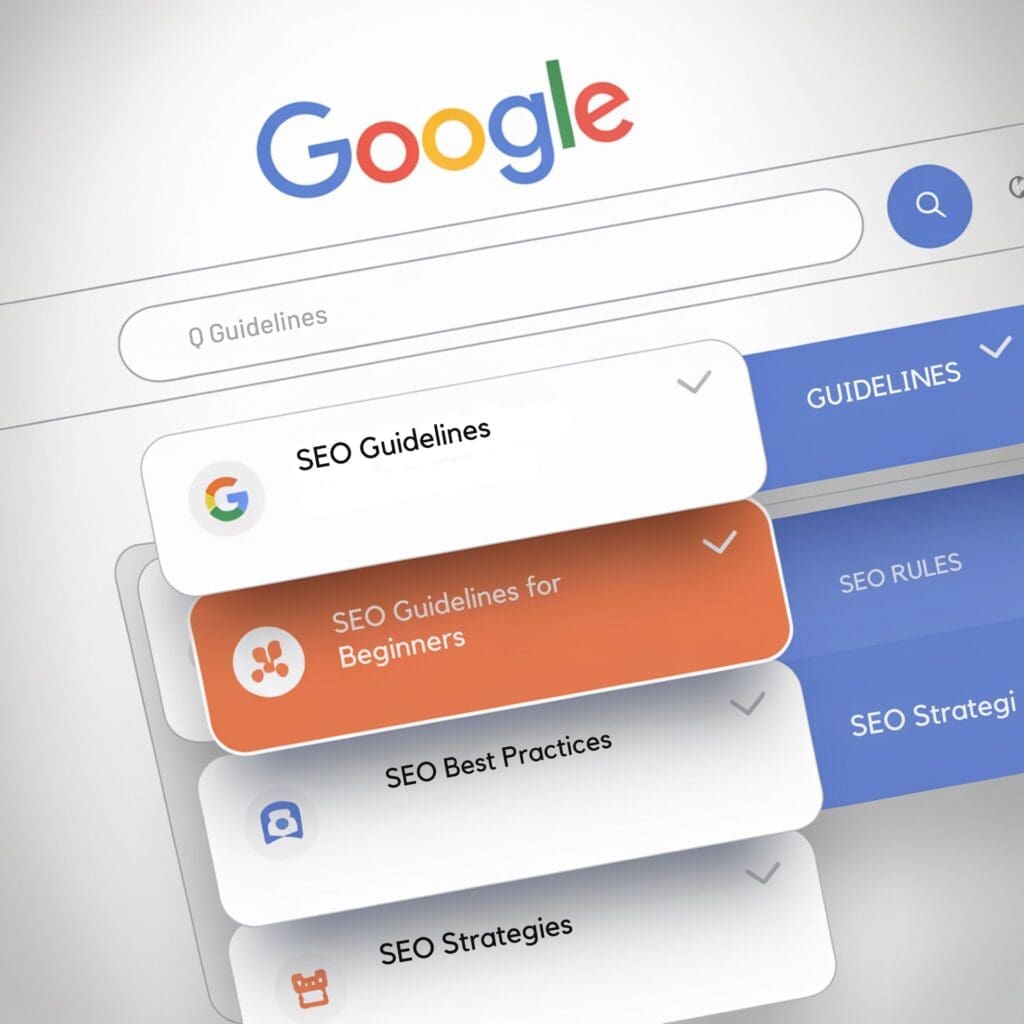Over the years, Google has produced many guidelines and documents to aid webmasters in understanding SEO and their views on link building.
If you’re here, you most likely want to understand what Google SEO rules and guidelines for link building exist.
The issue of course is that Google’s advice does alter slightly with time, so the information given here is strictly only accurate as of 20th December 2025, but for as long as we can remember (going back to 2008), the most important rules and guidelines haven’t changed, only the wording and clarity of them.

Google SEO rules and link building guidelines
Google’s most fundamental SEO rule (in one sentence)
- 1 Google’s most fundamental SEO rule (in one sentence)
- 2 What Google SEO documentation exists?
- 3 Google SEO rules
-
4
Can SEO or link building rules be inferred from Google’s guidelines?
- 4.1 Encourage natural linking
- 4.2 Internal linking
- 4.3 Link text (anchor text)
- 4.4 External or outbound links (links to other sites)
- 4.5 Rel=nofollow for paid links
- 4.6 Sponsored links
- 4.7 User-Generated Content (UGC)
- 4.8 Focus on link relevance
- 4.9 Crawlable links
- 4.10 Link context
- 4.11 Avoid link spam
- 4.12 Link exchanges and link schemes
- 4.13 Linking to low-quality sites
- 5 Are there any other link building guidelines?
- 6 Helpful SEO advice from Opace
While there are various documents and threads you can read, from Google Search Essentials (formerly Webmaster Guidelines) to their SEO Starter Guide, the golden rule is actually very simple:
Web pages should be built for users and not for search engines.
That was the case back in 2017 when this article was first written, and it’s still the case today.
What Google SEO documentation exists?
Two of the most important pieces of documentation have been mentioned above. There’s actually a significant number of resources and SEO guidelines available from Google online, but below we have compiled some of the most important ones.

Organising your keywords instead of stuffing them is good practice. Image via Pixabay.
Google’s SEO guidelines
- Google Search Essentials
- Google Search Central
- SEO Starter Guide
- Documentation to Improve SEO
- Do I Need SEO?
- Getting Started with SEO
- A guide to Google Search Ranking Systems
- Spam Policies
- Google Search Central on YouTube
Google’s content guidelines
- Creating Helpful, Reliable, People-First Content
- Google Search’s Guidance about AI-Generated Content
- Quality Rater Guidelines: E-A-T gets an extra E for Experience
Google’s technical guidelines
Google’s linking guidelines
Google’s link building guidelines?
Maybe not surprisingly, there is very little advice or guidance from Google about “link building ” specifically.

Link building rules, do they exist?
This is because “link building” is largely considered by Google to be a manipulative SEO technique to game rankings in search results. Their focus is far more on rewarding websites that create people-first content and those that provide positive user experiences for visitors.
There are plenty of hidden gems that relate to link building in the above guides, which we will attempt to summarise later in this article.
Failing that, there are plenty of other reputable sites and resources that discuss link building in depth.
What other SEO and link building guidelines exist?
Firstly, we can’t start without mentioning our own SEO guides and advice.
Below, you will find some of our most important guides that relate specifically to SEO processes and link building:
SEO Basics: The Simple SEO Guide for Website Owners [UPDATED]
What Are Backlinks in SEO & Does Link Building Still Work? [UPDATED]
Backlink Your Way to SEO Success: An Up-To-Date Link Building Guide [UPDATED]
Best Link Building Strategies: Top 10 Tips for Building High-Quality Backlinks [UPDATED]
Is Buying Backlinks Safe? Do Paid Links Have a Place in Modern SEO? [UPDATED]
Other useful sources of information that we highly recommend reviewing include:
- https://ahrefs.com/blog/link-building
- https://www.wordstream.com/link-building
- https://www.semrush.com/blog/link-building
- https://moz.com/beginners-guide-to-link-building
Google SEO rules
What is a rule?
First, let’s clarify what a rule is: A rule is a specific, enforceable requirement or policy that, if violated, results in direct penalties, actions, or consequences.
Does Google have SEO rules?
The closest example of an SEO rule from Google is its spam policies and content policies – these can be considered rules, as they involve clear actions taken against non-compliance (e.g. penalties for keyword stuffing, cloaking, or using deceptive practices).
However, the documents and resources provided are more accurately described as guidelines, recommendations, or best practices, rather than strict rules in the sense of SEO regulations.
For example, Google provides various recommendations for optimising content and links but does not provide hard “rules” that must be followed for ranking.
Does Google have link building rules?
For the reasons covered above, Google does not directly offer rules or guidelines for link-building, but enforces policies and provides guidelines that help webmasters align their sites with best practices for ranking.
Google clearly defines what is acceptable and unacceptable through its spam policies and other quality guidelines. However, these policies are general, focusing on behaviours that can result in penalties (such as link spam or cloaking), rather than specific technical instructions for achieving high rankings.
Can SEO or link building rules be inferred from Google’s guidelines?
It’s debatable whether everything below would be classified as a rule, guideline or recommendation, but we have taken the time to extract the most basic advice from Google to give a single, simple overview below.

Knowing the rules helps you avoid costly penalties. Image via Google.
Encourage natural linking
Google primarily finds pages through links from other pages it already crawled. These links can come naturally over time, and you can also promote your site to encourage others to link to your content or earn links organically through producing sharable content.
Internal linking
Use links to connect your users and search engines to other parts of your site or to relevant pages on other sites. Linking within your site is important for both users and search engines to understand the structure and relevance of your content.
Link text (anchor text)
The text in a link (anchor text) tells both users and Google something about the linked page. Use appropriate, descriptive anchor text that provides context and relevance to the content being linked to. This helps both users and Google understand the content of the linked page. Overloading the anchor text with unnecessary keywords or stuffing keywords is against Google’s guidelines and can lead to penalties.
External or outbound links (links to other sites)
When linking to external resources, make sure you trust the resource. If the external content is untrustworthy, use the nofollow tag to prevent passing your quality signals to untrusted sources. This helps avoid potential negative consequences for your rankings.
Rel=nofollow for paid links
Use the rel=nofollow attribute for paid links, user-generated content, or links that require login credentials.
Dofollow vs Nofollow Links & SEO: The Truth About the Nofollow Tag [UPDATED]
This prevents passing link equity to untrusted or irrelevant sources and helps maintain the integrity of your site’s link profile.
Sponsored links
If a link is part of a paid or sponsored arrangement, use the rel=”sponsored” attribute to indicate that the link is paid for. This ensures compliance with Google’s link guidelines.
User-Generated Content (UGC)
If you accept user-generated content (e.g., forum posts or comments), ensure that links posted by users are automatically tagged with a nofollow attribute to prevent spam and control link quality on your site.
Focus on link relevance
Links should add value by connecting users and search engines to relevant and trustworthy resources. This contributes to a better user experience and is beneficial for SEO.
Crawlable links
Google can only crawl links that are in <a> HTML elements with an href attribute. If the URL is not properly formatted or uses non-standard attributes (e.g., routerLink or onclick), Google may not be able to crawl or resolve the link correctly.
Link context
The context surrounding links is important. Don’t place links too closely together without context. Ensure each link is meaningful and not forced within a sentence or paragraph.
Avoid link spam
Do not engage in practices such as buying or selling links for ranking purposes, exchanging links solely to boost SEO, or using automated programs to generate backlinks. Google considers these practices as link spam, which can lead to penalties.
Link exchanges and link schemes
Excessive link exchanges or “reciprocal linking” solely for SEO purposes (i.e., “link to me, and I’ll link to you”) should be avoided. Google frowns upon such practices, as they don’t add value to the user experience.
Linking to low-quality sites
Avoid linking to low-quality or spammy websites. If necessary, use nofollow to avoid passing your site’s link authority to such sites, especially when you don’t fully trust the content or the source.
Are there any other link building guidelines?

SEO Guidelines
The above list covers all of the essentials, but if you would like some specific examples, we’ve added more below:
- Automated link software – Any service that produces wholesale links to your site is a no-no, so avoid these.
- ‘Planting’ unnatural links – This is a surefire way to negatively affect your SEO. Defined as a ‘creating a link that wasn’t editorially placed or vouched for by a site’s owner’, an unnatural link can come in many guises. For example, comments left in forums that include a keyword-stuffed link either within the post itself or within the signature, e.g. Thanks for the advice on used cars, Peter. Used cars are a minefield when buying used cars.
- Links added in low-quality “made for link building” directory sites – Directories have a place on the internet and are generally regarded by Google as being useful; however made have been built specifically for link building and don’t shy away from hiding it, so make sure you research the directory and check how well it ranks in Google before submitting your website.
- Website widgets or hidden links designed for link building – This can include widely distributed links within templates, footers and modules of websites.
The number 1 rule is “Don’t build links, earn them”. This covers all of the examples above and will save you a lot of pain and disappointment in the future.
Helpful SEO advice from Opace
There you have it, 13 Google SEO rules, guidelines and advice, all in one place, plus a whole heap of useful resources and examples relating to link building.
Dodging the Penguin isn’t hard as long as you know the guidelines.
If you decide to get support, working with an SEO company that understands the SEO rules is vital to ensure you get sustainable improvements and avoid costly penalties. Here at Opace, we know the importance of maintaining a good standing with search engines, so contact us today to find out how we can improve your SEO strategy.
Please leave any of your own comments or insights below or share them with us on social media.






Very interesting! Thanks for sharing the information about Google’s SEO rules which are a little more prescriptive with several guidelines to avoid a negative impact on our page ranking: